The third week of the 2022 Monsoon Session of the Parliament was marked by fewer disruptions compared to the previous two weeks. The week’s proceedings were dominated by the discussion on price rise, the economy, and a few important bills. Here is a review.
The Monsoon Session of the Parliament began on 18 July 2022. It is scheduled to be held till 12 August 2022 with a total of 18 sittings spread over 26 days. Since the beginning of the session, the houses have barely been able to transact significant business so far, with constant sloganeering from the opposition, causing frequent adjournments. The business in the third week has seen a slight improvement over the first two weeks of the monsoon session. We look at the key business during the third week of the ongoing monsoon session. (From 28 July 2022 to 04 August 2022).
Key Developments
The eighth day of the session (27 July 2022) started with the demand from the opposition for the revocation of the suspension of Congress MPs in the Lok Sabha. The day was also marked by constant adjournments till late afternoon in both the houses. Under Rule 377, a matter for reconsideration of the Agnipath scheme as well as the release of captured fishermen by Pakistani authorities was raised. In the Lok Sabha, the motion for consideration of ‘The National Anti-Doping Bill, 2022’ was moved and a discussion was held. After the discussion, the bill is passed by the house. It was first introduced on 17 December 2021 in Lok Sabha, following which it was referred to the Standing Committee, which submitted its report in March 2022.
The ninth day of the session also witnessed frequent adjournments due to protests. This time, it was by the treasury benches against a remark by an opposition member on the President of India. The Lok Sabha didn’t see any business development for the day. In the Rajya Sabha, The National Anti-doping Bill, 2022 as passed by the Lok Sabha was laid on the table. Some important matters like the demand and need for the creation of the ‘National Drinking Water Authority of India (NDWAI)’ and to lift the ban by states on the supply of excess solar energy to electricity grids could not be taken up due to constant disruptions. Also, three MPs were suspended for the rest of the week.
The tenth day of the session also witnessed constant protests leading to frequent adjournments. No significant business happened in either of the houses. Matters like beneficiaries of the Ujjwala scheme, financial assistance for farmers affected by heavy rains and the Agnipath scheme were raised under Rule 377. Matters like making mental health care more accessible, urgent steps for climate change mitigation and an increase in deposits of Indians in Swiss Bank could not be taken up because of protests.
The eleventh day of the session (01 August 2022) started with both the houses congratulating the medal winners in the Birmingham Commonwealth Games, 2022. In Lok Sabha, a report of the committee on Public Undertakings, titled, ‘Avoidable loss due to extension of the loan in terminated projects relating to India Infrastructure Finance Company Limited (IIFCL) based on C&AG Audit Para No. 5.2 of Report No. 18 of 2020’ was tabled. Matters like Legislations on Ecologically Sensitive Zones, grant of an additional attempt for UPSC examination aspirants affected by COVID-19, and service condition of Scientists working in DRDO were raised under Rule 377. ‘The Central Universities (Amendment) Bill, 2022’ was introduced in Lok Sabha, but its consideration and passing are postponed. The much-awaited discussion on price rise was taken up in Lok Sabha under Rule 193, to which Finance Minister replied. The discussion concluded in the Lok Sabha. In the upper house, the ‘The Weapons of Mass Destruction and their Delivery Systems (Prohibition of Unlawful Activities) Amendment Bill, 2022’, and ‘The Indian Antarctic Bill, 2022’ were passed as passed in the Lok Sabha.
The twelfth day of the session witnessed fewer disruptions comparatively. In the lower house, reports of the standing committee on Energy, Committee on Subordinate Legislation, and the committee on Petitions were laid on the table. Also, the report of the Joint Committee on the Biological Diversity (Amendment) Bill, 2021 was laid. ‘The Wildlife (Protection) Amendment Bill, 2021’ was considered, and the bill was passed in the Lok Sabha. In the Upper house, a short duration discussion was held on rising prices, with nearly 33 MPs participating in the debate. It was concluded with the remarks of the finance minister. ‘The Wildlife (Protection) Amendment Bill, 2021’ as passed in Lok Sabha was laid on the table of the house.
The thirteenth day of the session (03 August) saw the passage of bills like the ‘The National Anti-doping Bill-2022’ in the Rajya Sabha, and ‘The Central Universities (Amendment) Bill 2022’ in the Lok Sabha. ‘The Energy Conservation (Amendment) Bill, 2022 was also tabled in the Lok Sabha. In a surprising move, the Government proposed to withdraw the ‘Personal Data Protection Bill, 2019’. Further, a discussion on the need to promote sports in India was held under Rule 193.
The fourteenth day of the session was marked by opposition protests against the alleged misuse of central government agencies. Lok Sabha did not see any significant business, while the Rajya Sabha passed the Family Courts (Amendment) Bill, 2022 despite intense protests from the opposition.
Bills taken up
In this session, 32 Bills have been shortlisted for introduction, consideration, and passing in the Parliament, out of which 14 have been finalized. On the eighth day of the session, The National Anti-Doping Bill, 2022 was introduced in Lok Sabha by the Union Minister of Information & Broadcasting and Youth Affairs & Sports Anurag Thakur. The bill seeks to provide for the establishment of a National Anti-Doping agency for regulating anti-doping activities in sports. It is also in line with India’s international commitment against doping by UNESCO.
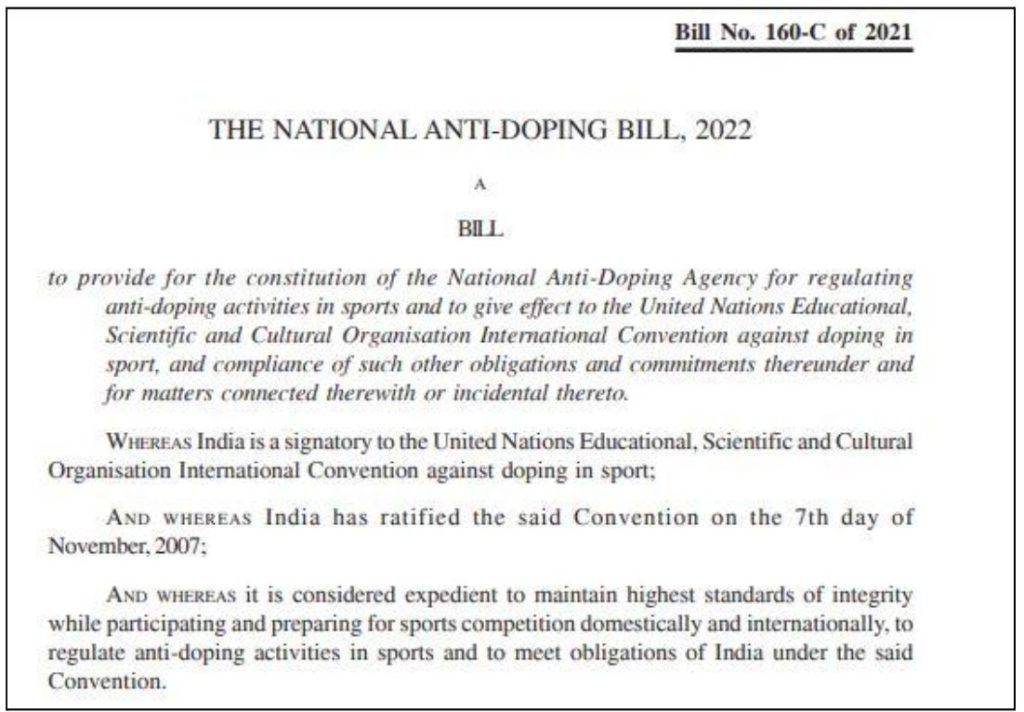
Source: Lok Sabha
A total of 18 MPs participated in the debate, and the motion was adopted. The bill was passed in Lok Sabha on the eighth day of the session, i.e., 27 July 2022. The bill was laid on the table of the Rajya Sabha on the following day. It was discussed in Rajya Sabha on 03 August, and after discussion, it was passed in the Upper House.
The Indian Antarctic Bill, 2022 and ‘The Weapons of Mass Destruction and their Delivery Systems (Prohibition of Unlawful Activities) Amendment Bill, 2022’ were passed in the Rajya Sabha as passed in the Lok Sabha.
The Central Universities (Amendment) Bill 2022 was introduced in the Lok Sabha. The Bill seeks to further amend the existing Central Universities Act, 2009, by introducing new section 3F, which seeks to establish Gati Shakti Vishwavidyalaya in Gujarat by converting the National Rail and Transportation University, Vadodara. It also amended sections 4 & 5 of the original act. The Bill is passed after discussion.
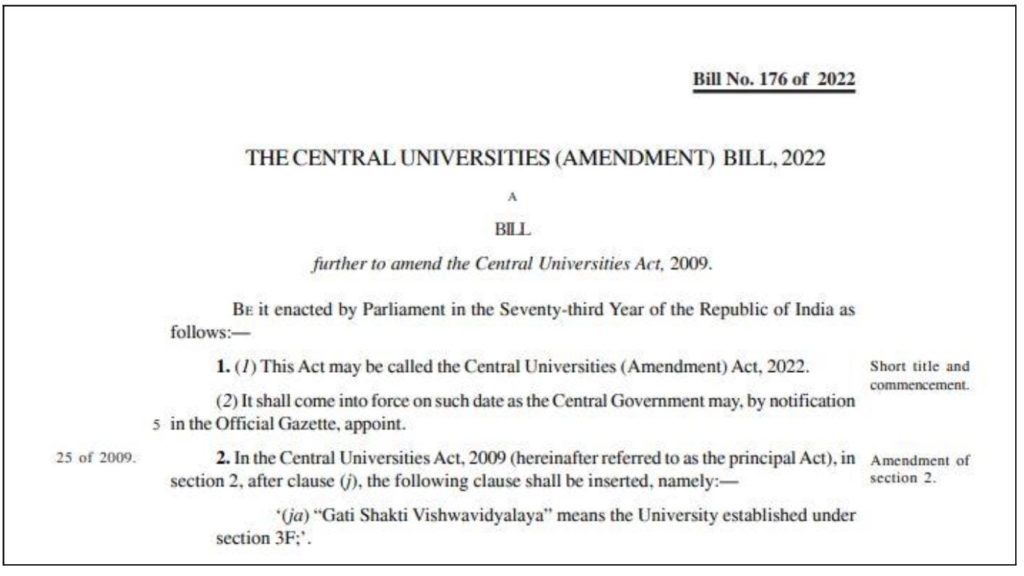
Source: Lok Sabha
Another important legislation titled, ‘The Wildlife (Protection) Amendment Bill, 2022’ was taken up for consideration and passed in Lok Sabha on 02 August. A total of 39 MPs participated in the debate, and the bill was passed.
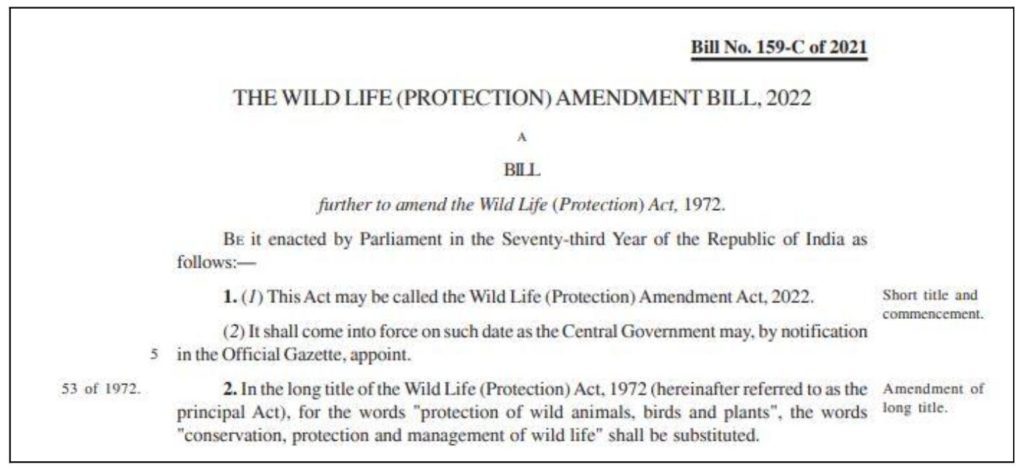
Source: Lok Sabha
The bill was initially introduced in December 2021 and was then referred to a standing committee. The committee submitted its report in April 2022, following which the bill is discussed. The bill seeks to amend the original Wildlife (Protection) Act, 1972 by widening its scope by substituting ‘wildlife’ in the place of ‘Tiger and other Endangered Species’. Other important aspects of the original bill and the summary of the committee report can be read here, and here.
Another bill, ‘The Energy Conservation (Amendment) Bill, 2022 was introduced in Lok Sabha to amend the Energy Conservation Act, 2001. The bill seeks to establish a state energy conservation fund by enacting a new section 16, and section 14A which authorizes the Union Government, or any agency authorized by it, to issue carbon credit certificates to entities compliant with the requirement of the carbon credit trading scheme. Similar amendments were made to different sections of the parent act. An explainer on the amendments can be read here.
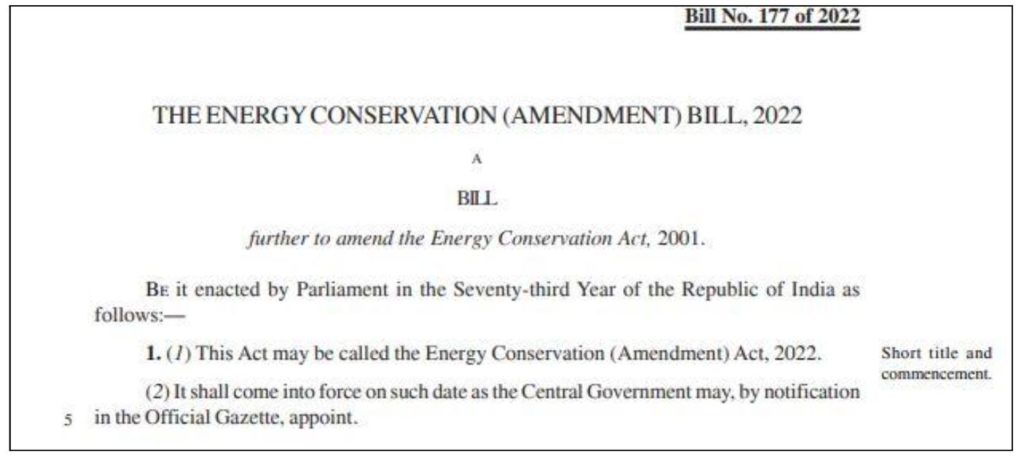
Source: Lok Sabha
Important Standing Committee Reports tabled
Action Taken report by the Government on the recommendations/ observations contained in the fifth Report of the Committee on the welfare of Scheduled Castes and Scheduled Tribes was tabled in the Rajya Sabha. The report, ‘Reservation for and Employment of Scheduled Castes and Scheduled Tribes in New Delhi Municipal Council’, consisted of recommendations for filling up the shortfall in both direct recruitments as well as the promotions of SCs and STs at all levels of employment. The committee had expressed displeasure at the functioning of NDMC in clearing the massive backlog of SC/STs posts.
Another action taken report titled, ‘Electric & Hybrid Mobility – Prospects And Challenges in Automobile Industry” pertaining to the Ministry of Heavy Industries”, was laid on the floor of Rajya Sabha. Major recommendations were regarding enhancing outlays for electric vehicle adoption policies and making efforts to transform India into a global manufacturing hub for electric vehicles.
On the energy sector front, multiple reports were tabled in the Lok Sabha by the Standing Committee on Energy. Action taken by the Government on the observations/recommendations contained in the Nineteenth Report (17th Lok Sabha) on the subject ‘Delay in Execution/Completion of Power Projects by Power Sector Companies’; action taken by the Government on the observations/recommendations contained in the Eighteenth Report (17th Lok Sabha) on the subject ‘Development of Coal Blocks allocated to Power Sector Companies’; Action-taken by the Government on observations/recommendations contained in Seventeenth Report (17th Lok Sabha) on the subject ‘Action Plan for Achievement of 175 GW Renewable Energy Target’; a report on power tariffs titled, ‘Review of Power Tariff Policy- need for uniformity in tariff structure across the country’ and ‘evaluation of wind energy in India‘ were tabled.
The Joint committee report on the ‘The Biological Diversity (Amendment) Bill, 2021’ was also tabled. The Committee on external affairs also tabled its fifteenth report title, ‘Welfare of Indian Diaspora- Policies/Schemes’.
Action Taken Report on recommendations contained in the Twentieth Report (17th Lok Sabha) on ‘Critical Evaluation of Mahatma Gandhi National Rural Employment Guarantee Act (MGNREGA)’ by the Standing Committee on Rural Development and Panchayati Raj was laid on the table of the lower house.
Key questions
In response to a question on the enumeration of census this year, citing the outbreak of COVID-19 as the reason behind the postponement of the census 2021 activities, the ministry did not provide a clear answer regarding the enumeration of census this year. Also, it clarified that there is no proposal to bring census into the concurrent list under the Seventh Schedule.
To a question on the undertrial prisoners lodged in prisons, the Ministry’s data suggests that the overall undertrials in India increased from 2,93,058 in 2016 to 3,71,848 in 2020. The government has clarified that there is no proposal to release all prisoners who have completed their rigorous life imprisonment sentenced tenure thereof, if so, the number of prisoners who have completed life sentences more than 25 years and are still in jail.
Regarding the safety of electric vehicles, the Government informed that a panel is constituted with independent experts from DRDO, Indian Institute of Science (IISC) Bengaluru and Naval Science & Technological Laboratory (NSTL) Visakhapatnam to look into the recent safety-related issues in the Electric Vehicles. A total of 6656 vehicles were recalled by the manufacturers as of April 2022.
On fake currency notes, the Minister of Finance responded that the number of fake currency notes seized in the country as per NCRB data has increased from 2272 in 2016 to 2,44,834 notes in 2020.
On the question of the state of Indian economy, the Minister of Finance responded that the debt to GDP ratio of India as a percentage of GDP rose from 48.5% in 2017-18 to 61.6% in 2020-21. The yearly interest burden during the same period grew from Rs. 5.29 Lakh Crore to Rs. 6.80 Lakh Crore.
Regarding a question on accommodating medical students from Ukraine, the Government responded that no such provisions exist in the Indian Medical Council Act 1956 & the National Medical Commission Act, 2019 as well as the Regulations to accommodate or transfer medical students from any foreign medical institutes to Indian medical colleges. No permission has been given by the NMC to transfer or accommodate any foreign medical students in any Indian medical institute/university. However, as per the latest notification, the students who had completed their course and got their degree completion certificate shall be allowed to appear for the Foreign Medical Graduate Examination.
Quick Snippets
- The National guidelines on Lactation Management Centre (LMC) in Public Health Facilities do not allow for the commercialization of breast milk in India. The Food Safety and Standards Act, 2006 and Rules and Regulations do not cover the commercial processing/selling of human milk. Donation of human breast milk is to be done freely and voluntarily without any monetary benefits to the donor.
- Education, Health Care, Rural Development projects, and Environmental Sustainability sectors top the CSR spending by the top-500 companies in India. These 4 sectors account for more than 60% of the total CSR expenditure. Expenditure on the PM National Relief fund jumped from Rs. 104.74 Crore in 2018-19 to Rs. 1510 Crore in 2020-21.
- A total of 4345 children lost both the parents due to the COVID-19 pandemic in India.
- A total of 37.76 Crore Jan Dhan Accounts were opened till December 2019, out of which 6.88 Crore accounts (18.2%) are inoperative. The deposit balance increased from Rs. 62,972 crores to Rs. 1,69,879 crores from March 2017 to June 2022.
- Conviction rates in UAPA cases are very low. The number of persons arrested in UAPA cases is 1421, 1958, and 1321 respectively from 2018 to 2020, while the number of persons convicted stands at 35, 34, and 80 respectively. This amounts to conviction rates of 2.5%, 1.7%, and 6% respectively.
- Using FASTag resulted in fuel savings of 35 Crore litres per year, equivalent to Rs. 2800 Crore per year, as per an impact assessment study. Around 9,78,200+ tons of Carbon dioxide (CO2) emissions have been reduced because of FASTag.
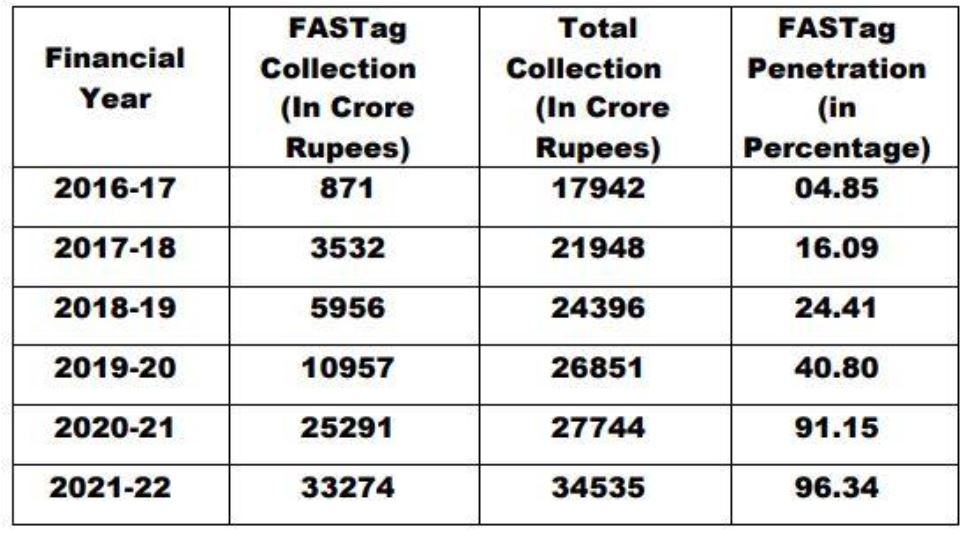
Incidentally, the Union Minister for Road Transportation and Highways promised to eliminate toll plazas on National Highways. It shall be replaced by an alternate system to bring relief from long queues for road users.
Featured Image: Parliament Review


